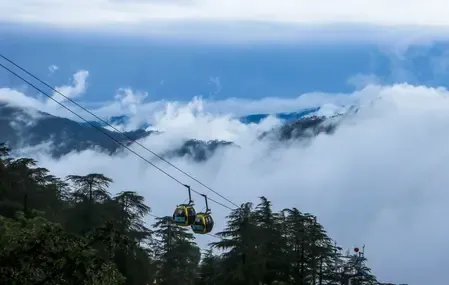Have Eco-Tourism Services Really Gone Online in Himachal Pradesh?

Synopsis
Key Takeaways
- Over 100 forest rest houses and camping sites can be booked online.
- A trekking management system features 245 routes categorized by difficulty.
- The Eco-Tourism Policy 2024 aligns with national environmental regulations.
- Over 200,000 tourists visited in 2024, boosting local economies.
- Local communities are actively involved in eco-tourism initiatives.
Shimla, Aug 17 (NationPress) Eco-tourism services have officially transitioned online in Himachal Pradesh. More than 100 forest rest houses and camping locations can now be reserved through the Himachal Pradesh Eco-Tourism Society (HPECOSOC) website.
A comprehensive trekking management system has been introduced, featuring over 245 trekking paths categorized by difficulty level. In addition, a mobile application is currently being developed to assist trekkers, as stated by an official on Sunday.
The government has assured that the Eco-Tourism Policy 2024 is in accordance with the regulations of the Union Ministry of Environment, Forest and Climate Change, as well as the revised Forest Conservation Act (Van Sanrakshan Evam Samvardhan Adhiniyam, 2023).
In 2024, more than 200,000 tourists visited Himachal Pradesh, including 82,000 international travelers, marking a 13.24% increase from the previous year. Tourism accounts for 7.78% of the state’s Gross State Domestic Product (GSDP), and the new eco-tourism initiative is anticipated to bolster the state’s economy significantly.
The eco-tourism strategy aims to develop 77 eco-tourism locations, with the government projecting a revenue generation of Rs 200 crore over five years. The intention is to draw in tourists while simultaneously safeguarding nature, creating local job opportunities, and fostering economic growth in a clean and sustainable manner. Under this initiative, 77 eco-tourism sites are being established in various regions, including Shimla, Kullu, Mandi, Bilaspur, Rampur, Solan, Nahan, Hamirpur, Nalagarh, Dharamsala, Palampur, Chamba, Dalhousie, Nurpur, and Rekong Peo.
Eco-tourism operators have already been appointed for seven prominent sites: Potter Hill and Shoghi in Shimla; Solang Nallah and Kasol in Parvati Valley, both situated in Kullu district. The remaining sites are being developed in phases. Visitors will have the opportunity to participate in eco-friendly activities such as trekking, birdwatching, forest camping, jungle walks, homestays, and nature interpretation trails.
A crucial aspect of the eco-tourism policy is the involvement of local communities. Eco-tourism committees have been established in each forest circle to oversee these initiatives. Local youth are being trained as nature guides and support staff. To date, over 70 guides and 135 multi-purpose workers have received training, which not only provides employment but also promotes environmental stewardship.
In just two and a half years, the government has laid a strong groundwork for eco-tourism. By preserving the environment, enhancing biodiversity, and supporting the local economy, Himachal Pradesh is setting an exemplary precedent for harmonizing tourism with nature.









